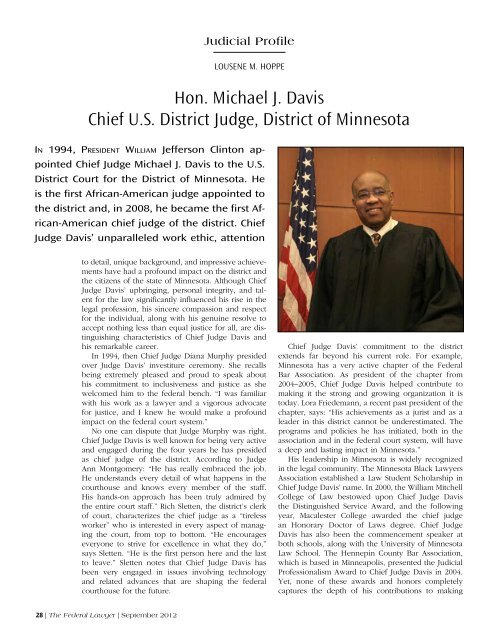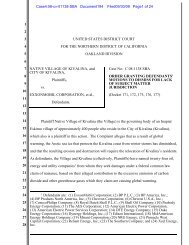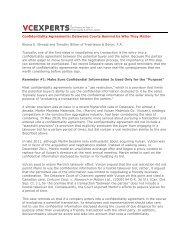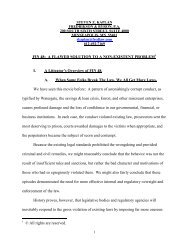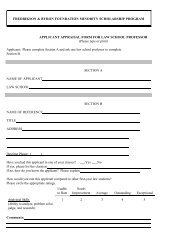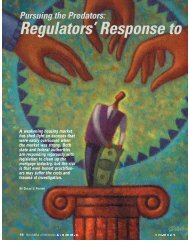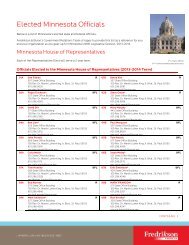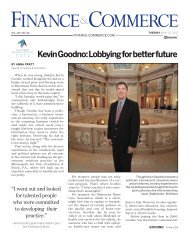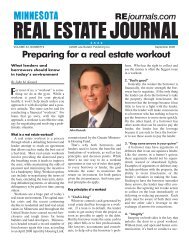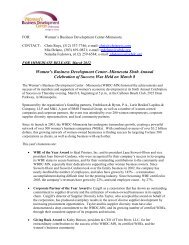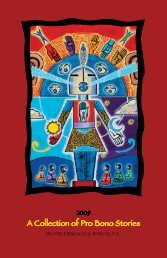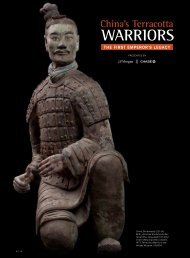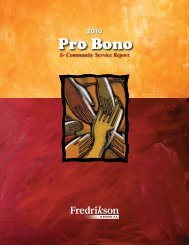Lousene Hoppe Article - Fredrikson & Byron PA
Lousene Hoppe Article - Fredrikson & Byron PA
Lousene Hoppe Article - Fredrikson & Byron PA
You also want an ePaper? Increase the reach of your titles
YUMPU automatically turns print PDFs into web optimized ePapers that Google loves.
28 | The Federal Lawyer | September 2012<br />
Judicial Profile<br />
lousene m. hoppe<br />
hon. michael J. Davis<br />
Chief u.s. District Judge, District of minnesota<br />
In 1994, PresIdent WIllIam Jefferson Clinton ap-<br />
pointed Chief Judge Michael J. Davis to the U.S.<br />
District Court for the District of Minnesota. He<br />
is the first African-American judge appointed to<br />
the district and, in 2008, he became the first African-American<br />
chief judge of the district. Chief<br />
Judge Davis’ unparalleled work ethic, attention<br />
to detail, unique background, and impressive achievements<br />
have had a profound impact on the district and<br />
the citizens of the state of Minnesota. Although Chief<br />
Judge Davis’ upbringing, personal integrity, and talent<br />
for the law significantly influenced his rise in the<br />
legal profession, his sincere compassion and respect<br />
for the individual, along with his genuine resolve to<br />
accept nothing less than equal justice for all, are distinguishing<br />
characteristics of Chief Judge Davis and<br />
his remarkable career.<br />
In 1994, then Chief Judge Diana Murphy presided<br />
over Judge Davis’ investiture ceremony. She recalls<br />
being extremely pleased and proud to speak about<br />
his commitment to inclusiveness and justice as she<br />
welcomed him to the federal bench. “I was familiar<br />
with his work as a lawyer and a vigorous advocate<br />
for justice, and I knew he would make a profound<br />
impact on the federal court system.”<br />
No one can dispute that Judge Murphy was right.<br />
Chief Judge Davis is well known for being very active<br />
and engaged during the four years he has presided<br />
as chief judge of the district. According to Judge<br />
Ann Montgomery: “He has really embraced the job.<br />
He understands every detail of what happens in the<br />
courthouse and knows every member of the staff.<br />
His hands-on approach has been truly admired by<br />
the entire court staff.” Rich Sletten, the district’s clerk<br />
of court, characterizes the chief judge as a “tireless<br />
worker” who is interested in every aspect of managing<br />
the court, from top to bottom. “He encourages<br />
everyone to strive for excellence in what they do,”<br />
says Sletten. “He is the first person here and the last<br />
to leave.” Sletten notes that Chief Judge Davis has<br />
been very engaged in issues involving technology<br />
and related advances that are shaping the federal<br />
courthouse for the future.<br />
Chief Judge Davis’ commitment to the district<br />
extends far beyond his current role. For example,<br />
Minnesota has a very active chapter of the Federal<br />
Bar Association. As president of the chapter from<br />
2004–2005, Chief Judge Davis helped contribute to<br />
making it the strong and growing organization it is<br />
today. Lora Friedemann, a recent past president of the<br />
chapter, says: “His achievements as a jurist and as a<br />
leader in this district cannot be underestimated. The<br />
programs and policies he has initiated, both in the<br />
association and in the federal court system, will have<br />
a deep and lasting impact in Minnesota.”<br />
His leadership in Minnesota is widely recognized<br />
in the legal community. The Minnesota Black Lawyers<br />
Association established a Law Student Scholarship in<br />
Chief Judge Davis’ name. In 2000, the William Mitchell<br />
College of Law bestowed upon Chief Judge Davis<br />
the Distinguished Service Award, and the following<br />
year, Macalester College awarded the chief judge<br />
an Honorary Doctor of Laws degree. Chief Judge<br />
Davis has also been the commencement speaker at<br />
both schools, along with the University of Minnesota<br />
Law School. The Hennepin County Bar Association,<br />
which is based in Minneapolis, presented the Judicial<br />
Professionalism Award to Chief Judge Davis in 2004.<br />
Yet, none of these awards and honors completely<br />
captures the depth of his contributions to making
Minnesota a place where everyone has equal access<br />
to the justice system.<br />
Justice for All: An Institutional Approach<br />
Chief Judge Davis’ focus on equal and meaningful<br />
access to the court system can be seen in every role<br />
he takes on. A prime example of this commitment is<br />
the Pro Se Project, which resulted from a collaboration<br />
between the Minnesota District Court and the<br />
Minnesota Chapter of the Federal Bar Association.<br />
Chief Judge Davis saw a need for the economically<br />
disadvantaged to have access to a skilled and qualified<br />
lawyer; he made the project a top priority of his<br />
tenure as chief judge.<br />
Since its inception in May 2009, the Pro Se Project<br />
has had a goal of providing civil pro se litigants with<br />
free legal consultation. When a civil pro se litigant<br />
appears in Minnesota District Court, the judge or magistrate<br />
judge may refer the case to the Pro Se Project<br />
to find a volunteer lawyer to consult with the pro se<br />
litigant. The judge’s referral letter to the pro se litigant<br />
contains contact information for the Pro Se Project<br />
coordinator, Tiffany Sanders, and the judge copies<br />
her on the letter with any relevant court documents.<br />
Sanders then connects the litigants with a volunteer<br />
lawyer to evaluate their case and advise them. If the<br />
case has merit, the attorney will often choose to enter<br />
an appearance on the litigant’s behalf.<br />
The Pro Se Project has had far-reaching impact.<br />
One litigant went to the hospital seeking care for his<br />
mental health issues. The hospital staff, unsure of how<br />
to handle him, called the police, who arrested the<br />
litigant and took him to the county detention center.<br />
Unfortunately, he was placed in painful restraints for<br />
hours, which exacerbated his behavior. As part of<br />
the resolution of this case, his Pro Se Project attorney<br />
got the detention center to change their policies<br />
regarding how they hold inmates with mental health<br />
issues. Sanders reports: “As a result of the skilled representation<br />
and counseling [the litigant] received, he<br />
completely turned his life around. I recently met with<br />
him at [his lawyer’s] office and he looks great, is doing<br />
great, and is truly thankful to the Pro Se Project for<br />
helping him regain his life.” The litigant later wrote the<br />
following letter in support of the Pro Se Project:<br />
For nearly a year I was a very heavy burden on<br />
the Court. People who don’t know what they<br />
are doing often are. Competent counsel early<br />
on would have saved much. It took extra time,<br />
effort, and patience, but fortunately the Court<br />
saw through my mistakes and mistakes it made<br />
because of me. The judge asked a Pro Se Project<br />
leader to consider this case. The first face-toface<br />
meeting was with [two local attorneys] …<br />
They treated me as professionally as if I had<br />
been an executive with a major company …<br />
The expertise and kindnesses of many attorneys<br />
with already full plates have rippled through<br />
countless lives in unimaginable ways.<br />
Last year, the American Bar Association selected<br />
the Pro Se Project to receive the Harrison Tweed<br />
award, one of the ABA’s most respected honors.<br />
Magistrate Judge Franklin L. Noel, the court’s liaison<br />
to the Pro Se Project, gave credit to Chief Judge Davis,<br />
noting that it was the chief judge “who had the vision<br />
to see the need for the program.”<br />
Justice for All: An Individualized Approach<br />
Matthew G. Tveite, a U.S. probation officer in the<br />
District of Minnesota, has worked with Chief Judge<br />
Davis for 10 years. “He is a firm believer in individual<br />
justice,” says Tveite, “which is not defined by<br />
a book or mandated by a group. Chief Judge Davis is<br />
always focused on the person before him.” The chief<br />
judge strongly promotes integration for those who<br />
are serious about reforming their lives. Tveite has<br />
seen the difference that this individualized attention,<br />
from someone in a position of power, can make for<br />
individuals with extreme challenges, such as addictions<br />
and multiple convictions. In one of Tveite’s first<br />
cases, a robbery, the defendant had a lengthy criminal<br />
history that dated back to 1977. He was also a longtime<br />
IV drug user. “During a probation hearing, Chief<br />
Judge Davis addressed him directly,” Tveite recalls.<br />
Among other things, the judge assured the defendant<br />
that he could still have a life if he really wants it, if<br />
he could use the resources offered and figure out<br />
how to change. Chief Judge Davis’ words made a<br />
huge impression on the defendant, who noted that<br />
the judge “treated him like a human being.” Tveite<br />
recalls that the defendant was released in 2007. “He<br />
was clean and doing well enough on probation that<br />
he was allowed to go on a fishing trip to Mexico.”<br />
Those who have worked for Chief Judge Davis<br />
universally remark on his sensitivity to those who<br />
appear before him and his demand that everyone<br />
be treated with respect, regardless of race, gender,<br />
disability, or other circumstance. Brenda Anderson<br />
was Chief Judge Davis’ court reporter for many years<br />
when he was on the Hennepin County Bench and for<br />
several years after he became a federal judge. When<br />
asked, she said she could speak for hours about cases<br />
where he made a real difference in the lives of individuals.<br />
“He was all about respect—respect for those<br />
appearing before them, for their lawyers, for his staff,”<br />
Anderson recalls. “Judge Davis is very sensitive to<br />
people and their unique circumstances.”<br />
Bill Manning, a lawyer in Minneapolis and longtime<br />
friend of the chief judge, remembers that on<br />
Nov. 21, 2000, President Nelson Mandela attended<br />
the NAACP annual banquet in Minneapolis. “Judge<br />
Davis and I got the opportunity to meet the president.<br />
I informed President Mandela that Judge Davis<br />
was one of the finest federal judges in this country.”<br />
davis continued on page 30<br />
September 2012 | The Federal Lawyer | 29
davis continued from page 29<br />
As Manning recalls, President Mandela looked very<br />
warmly into Chief Judge Davis’ eyes, studied his face,<br />
and said, “I can tell by his face that he is a good judge<br />
and that he makes compassionate decisions.”<br />
A Family Man at Heart<br />
Born in the late 1940s in Cincinnati and raised by<br />
his mother in Aurora, Ill., Michael Davis did not have<br />
the advantages that many others have. Early in his<br />
life, few may have predicted that he would one day<br />
become chief judge of one of the busiest federal districts<br />
in the country. His great-great-grandfather was<br />
a slave in Kentucky who escaped to Illinois, enlisted<br />
in the Union Army in 1863, and fought valiantly with<br />
the U.S. Colored Troops. Chief Judge Davis credits<br />
his mother, Doris Ruth Davis, with ensuring his future<br />
success through her love, care, and commitment to a<br />
good education for him and his brother. Although circumstances<br />
prevented Mrs. Davis from being able to<br />
complete her college education until she was in her<br />
50s, she worked tirelessly to ensure her sons went to<br />
good schools and had a chance for success.<br />
Chief Judge Davis graduated from Macalester<br />
College in St. Paul, Minn., in 1969. Influenced by the<br />
events surrounding the Civil Rights movement in the<br />
1960s, he opted to attend law school and received a<br />
J.D. from the University of Minnesota Law School in<br />
1972. During law school, Chief Judge Davis met his<br />
wife, Sara Wahl, who is a local attorney. The Davises<br />
have two sons: Mike, who is a community organizer;<br />
and Alex, who will be entering law school this fall.<br />
Eliminating Bias in the Court System<br />
Before becoming a judge, Chief Judge Davis was a<br />
criminal defense lawyer. He served as a law clerk for<br />
the Legal Rights Center from 1971–1973, and a criminal<br />
defense lawyer for the Neighborhood Justice Center in<br />
1974. He later returned to the Legal Rights Center as<br />
an attorney for three years, before being hired at the<br />
Hennepin County Public Defender’s Office.<br />
The Legal Rights Center is a community-driven,<br />
nonprofit law firm that specializes in adult and juvenile<br />
criminal defense and restorative justice practices and<br />
advocacy. Founded in 1970 by community leaders such<br />
as Doug Hall, leaders of the American Indian movement,<br />
and leaders of The Way (a North Minneapolis<br />
African-American youth organization), the center’s<br />
objective is to be a law firm “Of and For the People.”<br />
Chief Judge Davis’ early experience as a law clerk and<br />
attorney at the center had a profound impact on his<br />
legal career and his understanding of what meaningful<br />
access to justice for the individual entails.<br />
“You have to understand the historical context to<br />
understand why the Legal Rights Center has been so<br />
important to the Twin Cities community,” explains<br />
Craig Boone, who worked at the center with Chief<br />
Judge Davis during its early years. As Boone tells it,<br />
30 | The Federal Lawyer | September 2012<br />
there was a strong sense among the African-American<br />
and American Indian communities that they were disenfranchised<br />
from the justice system. From arrest to<br />
conviction to incarceration, racial and ethnic minorities<br />
were surrounded by a sea of white faces. “The Legal<br />
Rights Center used advocates from these communities<br />
as liaisons between the center lawyers and their minority<br />
clients,” Boone says. “Michael Davis was deeply<br />
involved in this effort to obtain equal access to justice<br />
for the community. Mike was the best lawyer of us all.<br />
When he speaks in court, people listen.”<br />
One of the earliest community advocates was<br />
Willie Mae Dixon. Chief Judge Davis speaks of her<br />
fondly: “She was only about four feet, 10 inches tall,<br />
but she was incredibly important to the center. She<br />
opened many doors in the African-American community.<br />
Despite her death from breast cancer at age<br />
40, she was one of the strongest people I’ve ever<br />
known.”<br />
Chief Judge Davis carried these early experiences<br />
into the courtroom as a lawyer and judge. In addition,<br />
from 1977–1981, he served as an attorney commissioner<br />
at the Minneapolis Civil Rights Commission. In 1990,<br />
he was appointed to the Minnesota Supreme Court<br />
Racial Bias Task Force. Hon. Rosalie Wahl, the first<br />
woman Supreme Court justice in the state of Minnesota<br />
and, incidentally, Chief Judge Davis’ mother-in-law,<br />
chaired the committee. As Editorial Committee chair,<br />
Chief Judge Davis was largely responsible for the comprehensive<br />
and influential Final Report the Task Force<br />
issued in 1993. Minnesota Supreme Court Justice Alan<br />
Page, who chaired the committee tasked with implementing<br />
the recommendations in the report, speaks<br />
very highly of Chief Judge Davis’ work: “Judge Davis<br />
and Justice Wahl were central in starting the task force<br />
and producing the final report. Many of their specific<br />
recommendations have been implemented. But the<br />
key accomplishments were to cast light on disparities<br />
in the treatment of racial minorities in Minnesota and<br />
to highlight the need for some serious focus on this<br />
problem.”<br />
An Excellent Lawyer, An Excellent Judge<br />
Hennepin County Judge Lyonel Norris clerked at<br />
the Public Defender’s office in the early 1980s and<br />
was assigned to Chief Judge Davis’ trial team. “He<br />
was an astonishingly good trial lawyer,” says Norris.<br />
“He made criminal defense look really easy, and then<br />
educated us about why it wasn’t easy at all.” Those<br />
who had the opportunity to see Chief Judge Davis<br />
try cases recall his strong courtroom presence. Well<br />
over six feet tall, he strikes an imposing figure. “But<br />
he was very soft-spoken, precise in his questioning,<br />
and extremely engaging in his openings and closings.<br />
He often had the jury at the edge of their seats,<br />
hanging on his every word,” Norris recalls. “And he<br />
was always prepared. He knew his cases inside out.”
Later, Judge Norris served as his law clerk in both<br />
state and federal court.<br />
This excellence carried over into his 29-year career<br />
on the bench. Judge Diana Murphy, who now sits<br />
on the Eighth Circuit Court of Appeals, states that<br />
she is continually “impressed with the quality of his<br />
opinions.”<br />
During his 18-year tenure on the federal bench,<br />
Chief Judge Davis has made a number of important<br />
and impactful rulings. For example, in a dispute<br />
between the United States and the Mille Lacs<br />
Band of Chippewa Indians over treaty rights, Chief<br />
Judge Davis ruled that various laws and regulations<br />
would not be applied to reduce the band’s share of<br />
natural resources and interfere with their exercise<br />
of hunting, fishing, and gathering rights under an<br />
1837 treaty. 1 This decision was upheld by the both the<br />
Eighth Circuit and the U.S. Supreme Court.<br />
In 1999, a candidate for judicial office sued the<br />
state boards and offices responsible for establishing<br />
the judicial code of ethics, alleging that certain canons<br />
violated their constitutional rights. Chief Judge Davis<br />
upheld the judicial code, which included canons<br />
restricting candidates’ attendance at political functions,<br />
prohibiting candidates from personally soliciting<br />
campaign contributions, and barring candidates<br />
from announcing their positions on legal and political<br />
questions that might come before them in court. 2 The<br />
Supreme Court reversed this decision in a 5-4 vote,<br />
which retired Justice Sandra O’Connor later regretted.<br />
In a talk at the New York University School of Law on<br />
Oct. 11, 2006, Justice O’Connor said that she wished<br />
she had voted with the minority given the decision’s<br />
implications for judicial independence.<br />
Chief Judge Davis presided over the first trial in the<br />
ongoing battle between the music industry and individuals<br />
who download music from file-sharing websites.<br />
After the defendant was initially found liable, he<br />
granted her a new trial on the grounds that violation<br />
of the exclusive distribution right requires actual dissemination.<br />
3 Two trials later, the parties’ cross appeals<br />
are pending in the Eighth Circuit.<br />
Chief Judge Davis also presided over one of the<br />
largest multidistrict litigation (MDL) cases to date, In<br />
re: Baycol Products Litigation. Attorneys who worked<br />
on that case are highly complementary of the way<br />
his office handled such a large and complex MDL.<br />
Charles “Bucky” Zimmerman, who served as co-lead<br />
attorney for the Baycol Plaintiffs, recalls that Chief<br />
Judge Davis approached the case with a great amount<br />
of commitment and creativity. “He wasn’t afraid to<br />
handle things outside of typical federal court protocol,”<br />
Zimmerman said. “For example, he had joint<br />
hearings for related state and federal cases. He even<br />
appointed a special master as a liaison between the<br />
state and federal judges. Chief Judge Davis provided<br />
opportunities for the lawyers on both sides to meet<br />
and work things out in a civil manner—even if he<br />
had to travel all over the country.” Professor Roger<br />
Judge Davis and Pro Se Project volunteers accepting the ABA’s Harrison<br />
Tweed award.<br />
Haydock, the court-appointed special master in the<br />
Baycol MDL, said that the judge is “one of the preeminent<br />
judges in America. He is fair, open-minded,<br />
and courageous. Judge Davis focuses on what’s fair to<br />
the parties and what produces the best civil justice.”<br />
Despite a very demanding caseload and involvement<br />
with a myriad of other community organizations,<br />
Chief Judge Davis also served as a judge on the<br />
Foreign Intelligence Surveillance Court (FISC) from<br />
1999–2006. Judge James C. Carr, who served with<br />
Chief Judge Davis on the FISC, recalls him as softspoken<br />
and insightful member of the court: “Judge<br />
Davis typically spoke less but said more than the rest<br />
of us. He did so with thoughtfulness, grace and civility,<br />
even when we were discussing very challenging<br />
and contentious issues under the Fourth Amendment<br />
and other provisions of the Constitution. It was a<br />
pleasure to serve with him.”<br />
More recently, Chief Judge Davis has traveled<br />
repeatedly to the District of Arizona to help reduce<br />
that district’s case backlog. Currently, he sits on<br />
the Board of Directors of the Legal Rights Center,<br />
the University of Minnesota Foundation, as well as<br />
on the advisory board of the Jack Mason Law and<br />
Democracy Initiative, a project of Books for Africa.<br />
He is also a former national board member of Equal<br />
Justice Works.<br />
Educator, Mentor, Friend<br />
For more than 30 years, Chief Judge Davis has<br />
served as a trial practice instructor or adjunct professor<br />
at William Mitchell College of Law and the<br />
University of Minnesota Law School. He loves training<br />
and mentoring law students and young lawyers to<br />
become better courtroom advocates. Recently, one of<br />
his students, who participated in a mock trial, wrote<br />
davis continued on page 32<br />
September 2012 | The Federal Lawyer | 31
davis continued from page 31<br />
him an e-mail thanking him for his time and attention<br />
to her development. She wrote:<br />
As you know, I adore trial lawyers, probably<br />
because I know I have some natural weakness<br />
to talk in front of a lot of people, [and] to deliver<br />
a presentation. However, today, I was not nervous<br />
at all when I was standing right in front of<br />
so many jury members, judges, colleagues, and<br />
other auditors … I really want to overcome my<br />
weakness and now I know how to do it[:] preparation,<br />
preparation and preparation. Judge, you<br />
have been so nice to us. You might still remember<br />
the night when each of us wanted to take a<br />
picture with you at your courtroom. I recall that<br />
it was almost 11 p.m. … however, you were so<br />
patient to let us take pictures one by one … I<br />
was pretty touched at that moment. Everything<br />
you did was like a father … instead of a highly<br />
prestigious Chief Judge at a Federal Court.<br />
Chief Judge Davis was also one of the first judges<br />
to become knowledgeable in forensic DNA identification<br />
testing. This expertise led the FBI to invite him<br />
to lecture at the FBI Academy on the use of DNA<br />
evidence in the courtroom. In addition to local law<br />
schools, he has enjoyed years of service as a lecturer<br />
or instructor in trial practice and other areas at various<br />
institutions, including the Hubert H. Humphrey School<br />
of Public Affairs and Oxford University’s Magdalen<br />
College. In recent years, his role as educator has<br />
taken on an international reach. Educating judges in<br />
other countries about the American legal system has<br />
led Chief Judge Davis to Egypt, Uganda, and Senegal.<br />
He recently visited the Kingdom of Saudi Arabia to<br />
assist the State Department in an effort to invite Sharia<br />
judges to visit the United States to learn, compare,<br />
and contrast their legal system with ours.<br />
Chief Judge Davis has served as a mentor to lawyers<br />
at various stages in their legal careers. Judge<br />
Wilhelmina Wright of the Minnesota Court of Appeals<br />
met Chief Judge Davis in 1995, shortly after arriving<br />
in the Twin Cities to take a position at the U.S.<br />
Attorney’s Office in Minneapolis. While appearing<br />
before him, she was struck by the manner in which<br />
he conducts legal proceedings. His seriousness of<br />
purpose and his expectation that prosecutors treat<br />
all defendants with respect, as he does, impressed<br />
her and set the tone for her practice. She also speaks<br />
highly of his balanced approach to sentencing, which<br />
involves consideration of both the punitive and rehabilitative<br />
aspects. Chief Judge Davis encouraged her<br />
to apply for a state-court judgeship and served as an<br />
important resource during her preparation for the<br />
bench. Judge Wright says that his mentorship, friendship,<br />
and counsel is not reserved for fellow lawyers<br />
and judges, but is given to children and law students<br />
32 | The Federal Lawyer | September 2012<br />
who aspire to be lawyers or judges themselves.<br />
U.S. District Judge Donovan Frank also attests to<br />
this commitment. He has worked with Chief Judge<br />
Davis for more than 22 years and considers him his<br />
best friend. Before they were nominated to the federal<br />
bench, they served together as state court judges<br />
in different districts and worked on several statewide<br />
committees, including the Racial Bias Task Force.<br />
Along with Judge Frank, Chief Judge Davis has served<br />
as a host judge of the Minnesota FBA chapter’s Open<br />
Doors to Federal Courts Program, an educational<br />
program designed to expose school-age children to<br />
the workings of the federal court system. In addition,<br />
both judges regularly invite legal and community<br />
groups to federal court for mock trials or other<br />
programs. Chief Judge Davis has frequently hosted<br />
African-American students from Just the Beginning<br />
Foundation. Judge Frank also noted: “Judge Davis can<br />
address those students and say, ‘Look at me. I came<br />
from a very modest background. If I can be a federal<br />
judge, so can you. Set your dreams and goals high.<br />
Don’t be discouraged by your circumstances.’”<br />
Chief Judge Davis recognizes Justice Thurgood<br />
Marshall as the greatest lawyer of the twentieth century.<br />
Those who know the chief judge best are certainly<br />
familiar with the framed picture of Justice Marshall’s<br />
July 4, 1992, challenge to America that hangs in his<br />
office, which states in part:<br />
The legal system can force open doors, and,<br />
sometimes, even knock down walls. But it cannot<br />
build bridges. That job belongs to you and<br />
me. We can run from each other, but we cannot<br />
escape each other. We will only attain freedom<br />
if we learn to appreciate what is different and<br />
muster the courage to discover what is fundamentally<br />
the same. Take a chance, won’t you?<br />
Knock down the fences that divide. Tear apart<br />
the walls that imprison. Reach out; freedom lies<br />
just on the other side.”<br />
No one I know embodies these principles more<br />
than Chief Judge Michael J. Davis.<br />
<strong>Lousene</strong> <strong>Hoppe</strong> is a senior associate at <strong>Fredrikson</strong> &<br />
<strong>Byron</strong>, P.A., in Minneapolis, Minnesota. She served as<br />
a law clerk to Chief Judge Davis in 2007.<br />
Endnotes<br />
1 Mille Lacs Band of Chippewa Indians v. Minnesota,<br />
952 F. Supp. 1362 (D. Minn. 1997), aff’d 124 F.3d 904<br />
(8th Cir. 1997), aff’d 526 U.S. 172 (1999).<br />
2 Republican Party of Minnesota v. White, 63 F.<br />
Supp. 2d 967 (D. Minn. 1999), aff’d 247 F.3d 854 (8th<br />
Cir. 2001), rev’d and remanded, 536 U.S. 765 (2002).<br />
3 Capitol Records v. Jammie Thomas, Civ. No. 06-<br />
1497 (D. Minn. 2008).


